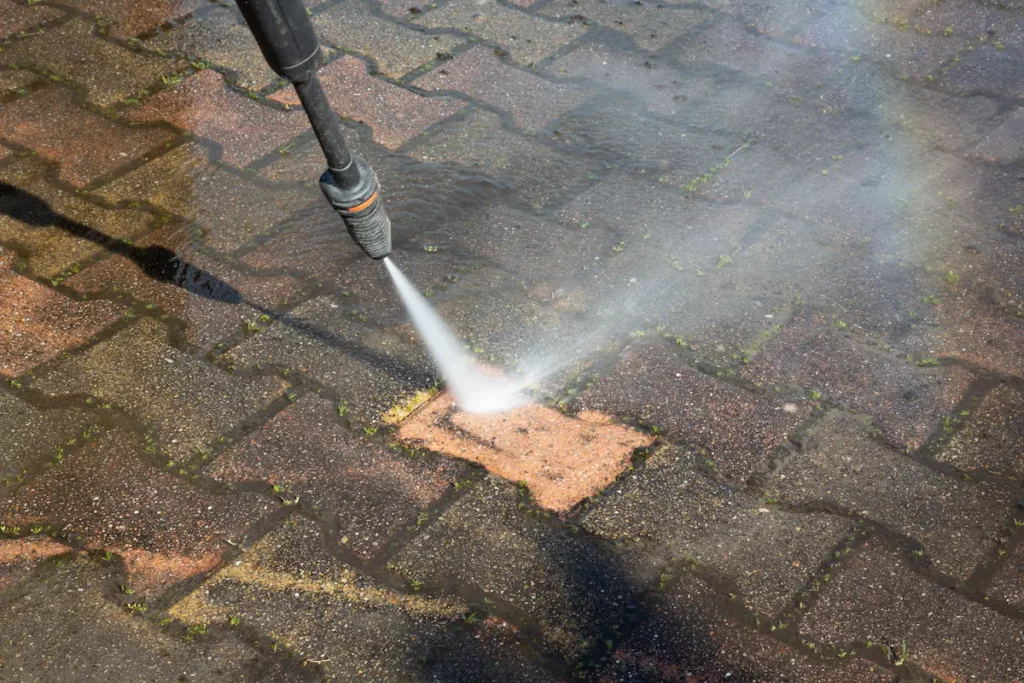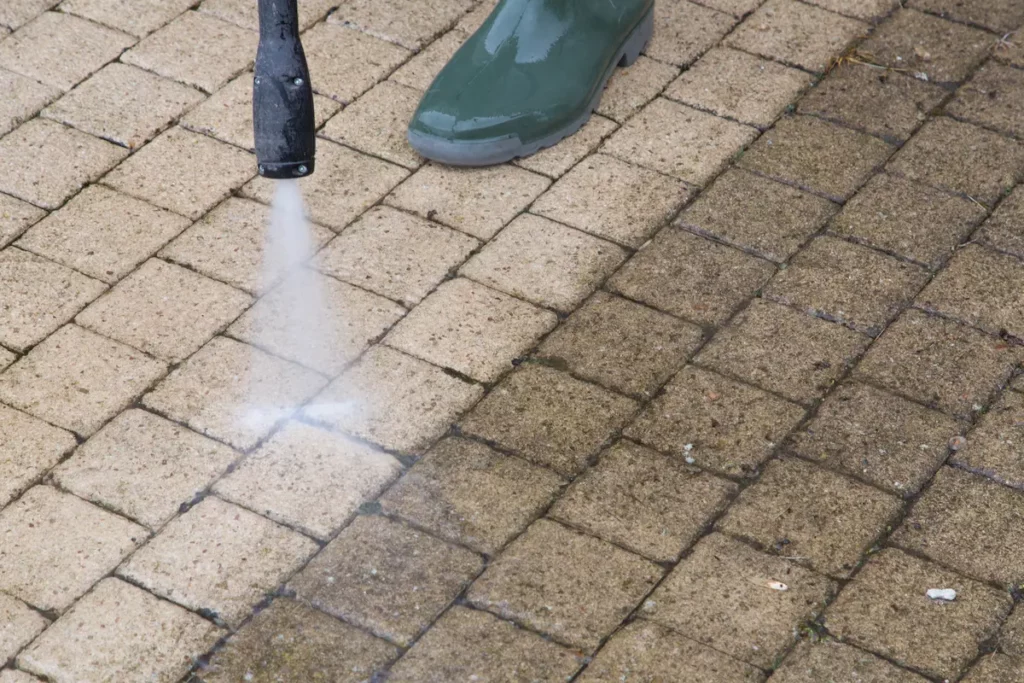To pressure wash a driveway effectively, you need a washer that produces at least 2000 PSI. It should be pumping out 2.5 gallons of water per minute. If you are wanting a more commercial clean, then go with a gas washer. These are more powerful than their electric counterparts.
When it comes to pressure washers, you can choose either electric or gas-powered models. Electric washers don’t provide as much power as gas units, yet that doesn’t mean they aren’t ideal for driveways. Having too much pressure can cause damage to the concrete surface.
So, you may be wondering: Do I go with an electric pressure washer or a gas unit? Read on to find out which washer is the best size for cleaning your driveway.

Related Reading: How Much PSI Do I ACTUALLY Need In A Pressure Washer?
How much pressure do I need to clean a driveway?
Electric and gas pressure washers both have their advantages and disadvantages.
Electric pressure washers are cheaper and require less maintenance than gas units. However, they produce less pressure. Typically, an electric washer outputs 1300–1700 PSI and a water flow of 1.5 GPM. When it comes to cleaning hard surfaces, such as your driveway, this level of power isn’t enough.
Gas pressure washers are designed more for the commercial end of the market. You can find units that cater to the domestic market, producing 2000–2800 PSI and 2.8 GPM. Yet, you will need a higher-end machine if you want to give your driveway a good clean. The bigger units can offer up to 4000 PSI and 4 GPM.
When it comes to pressure washers, bigger isn’t necessarily better. If you use too much pressure on your driveway, the result is that you could damage the concrete. This can mean you are now facing a repair bill.
So, is there an ideal level of pressure that will clean your driveway without harming the concrete? Experts will tell you that 3000 PSI with 4 GPM is sufficient for the job. For more stubborn marks on your driveway, you will need higher pressure.
Related Reading: Best Pressure Washers Under $200 and Under $300
How to clean your driveway with a pressure washer
For cleaning your driveway, there is a little bit of preparation work that needs to be done. You want to ensure that the plants and surrounding area are kept safe. Also, you want to protect yourself as you are using a high-powered piece of machinery.
Let’s take you through the steps of pressure washing your driveway.
1. Use tarps to cover your plants and flowers
If you are using cleaning chemicals to wash your driveway, you want to keep the surrounding greenery safe. Place tarps or cloths over your plants and flowers. Once you have completed your cleaning task, remove the covers.
2. Put on protective gear
You are working with at least 3000 PSI of pressure. That means there will be a lot of noise. Protect your hearing with earplugs. The water and debris can spray back towards you, so wear goggles and protective footwear to keep your eyes and feet safe.
3. Ensure that the driveway surface is free of debris
Use a broom to sweep away the surface dust and debris. A medium-hard to hard-bristled broom is ideal as the stiff bristles can loosen any stubborn dirt. Spend time on this process, as you want to have the area as clean as possible before you start pressure washing the driveway.
4. Unclog the airways
Once you have connected your pressure washer hose to the faucet, squeeze the trigger of your sprayer head for about 30 seconds. Wait until you get a steady stream of water coming out of the head. This purges any trapped air out of the system.
5. Select your nozzle
If you only want to wash your driveway with some soap, then use the 65-degree nozzle. This is specifically designed for the purpose and offers the lowest amount of pressure.
To blast away the stubborn dirt and marks from the concrete, select the 25-degree tip. Tougher stains may require a 15-degree nozzle.
You can opt to use a dial nozzle if the idea of swapping over tips seems a little overwhelming. Dial nozzles allow you to switch between several different degree settings without having to change out the tips.
Avoid using the 0-degree tip. This is because you could end up carving out a crater on your driveway’s surface.
Related Reading: Are All Pressure Washer Nozzles Universal?

6. Begin at the top and work your way down
Start your power cleaning at the top of the driveway and work your way towards the bottom. This allows the dirty water to run off towards the base of the driveway.
Clean in small sections. That makes the process more manageable. If you have a driveway that has been constructed in sections, use these as your guide.
Wash from the center of the section towards its edge.
We mentioned nozzles in the last step, but you could consider getting a power washer surface cleaner. This attaches to the spray head of your washer and can save you time.
7. Seal your concrete
Allow your driveway to dry completely, then apply a sealer over the surface.
Concrete can tend to crack if water is allowed to be absorbed into it. Sunlight and oxygen can also cause damage to your driveway. Applying a sealant prevents water, sunlight, and air from permeating the surface.
Also, a sealant creates a protective layer over the driveway. This repels oil and other liquids, making your driveway easier to clean and maintain.
8. Clean up your garden
If you have used soap or chemicals while pressure washing your driveway, there is the possibility that there has been some spray back or leaks toward your garden.
Remove the covers from your plants and flowers. Then give your garden a good rinse with a hose.
Continue Reading: Will Pressure Washers Remove Oil From Concrete? [ANSWERED]
Conclusion
It is possible to wash your driveway with a pressure washer. The recommendation is to have a washer that can produce 3000 PSI and 4 GPM.
You may get away with using slightly less pressure, but the job will take longer. For example, cleaning your driveway using a pressure of 2000 PSI and 2 GPM will take around 10 minutes. This time is halved when using 3000 PSI and 3 GPM.
Using too much pressure can cause craters and other surface damage to your driveway. So, be careful.
